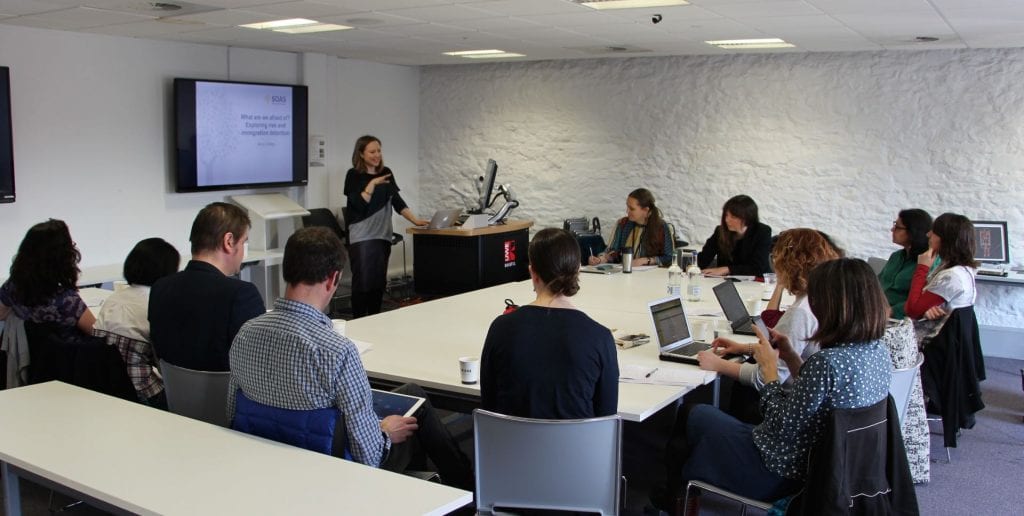By Katharine Charsley, University of Bristol and Emma Agusita, University of of the West of England

The Risky Relationships workshop, held at the Arnolfini on 27th & 28th March 2019, aimed to explore the navigation of immigration regulation in family and intimate relationships from a variety of perspectives.
The event invited participants to view the contemporary landscape of family migration and ‘intimate mobilities’ (Groes & Fernandez 2018) from the analytical perspective of risk. The optic of risk has appeared in various forms in the migration research literature, including work on migration decision making, household risk management strategies, and the physical risks of some forms of cross-border mobility. Issues of families and relationships have, however, been neglected amid a focus on economic and refugee migration. This absence is all the more surprising considering how discourses of risk are employed to justify tightening restrictions on family migration, and to distinguish some kinds of border-crossing relationship from others. For couples and families divided by borders, or with mixed immigration status, immigration regulations create risks of separation, and futures contingent on navigating a variety of economic, legal, practical and emotional risks. Increasing restrictions to family migration have both heightened the risks involved and expanded them to affect a wider variety of actors. These risks are often patterned along ethno-racial, gender and class lines.
‘Genuineness’ in migrant relationships
Sponsored by Migration Mobilities Bristol, The University of Bristol Faculty of Social Science and Law Strategic Fund, and University of the West of England Faculty of Arts, Creative Industries and Education, the workshop included contributions from social science, arts and culture, and legal practitioner perspectives. After an introduction from Katharine Charsley outlining the topic and the many layers of risk discourse and risk management which interact in creating the landscape for contemporary family migration (from government policy through legal practice to family networks), Emma Agusita and Iris Sportel explored the issue of genuineness – a key criteria for immigration applications based on marital relationships. In both papers, we saw how dominant discourses colonise the internal dynamics of couples, so that they may constantly seek to document and display the genuineness of their relationships, or question the intentions of a foreign spouse.
Sian Pearce from Avon and Bristol Law Centre spoke about the risks for former unaccompanied minors who struggle to establish a right to stay in the UK as a result of inadequate representation and restrictive interpretations of the law. Any relationships formed by those with ‘precarious’ immigration status (including those with long-standing foster parents) are given little weight in tribunal considerations, but the issue of precarity has wider implications in this field, as only those with Citizenship or Indefinite Leave to Remain are exempt from this category.
Risks from control
Anna Lindley’s paper on immigration detention showed how whilst the case for risk of harm to migrants from detention is often difficult to make given restrictive definitions, considerations of risks to society presented to justify detention are much more expansive, and often based on problematic evidence.  Natasha Carver’s paper contrasted the risks faced by Somali couples attempting to reunite under British immigration law, with the easier experience of those able to access spousal immigration through EU membership. As a result, the latter category of couples are sometimes unprepared for the risks and requirements of subsequent settlement applications. Bridget Anderson’s reflections on risk, uncertainty, temporality and agency in understanding migration and mobility brought together many threads from our discussions, interweaving them with new theoretical insights.
Natasha Carver’s paper contrasted the risks faced by Somali couples attempting to reunite under British immigration law, with the easier experience of those able to access spousal immigration through EU membership. As a result, the latter category of couples are sometimes unprepared for the risks and requirements of subsequent settlement applications. Bridget Anderson’s reflections on risk, uncertainty, temporality and agency in understanding migration and mobility brought together many threads from our discussions, interweaving them with new theoretical insights.
Visualising risks
Various forms of written and artistic creativity further stimulated our discussions. Some presentations from researchers who had dealt with issues of immigration in their own relationships had auto-biographical elements. Emma Agusita’s Visualising Love exhibition brought the experiences of couples negotiating the UK’s spousal immigration regulations to life, whilst Sine Plambech’s award winning film Heartbound documented how Thai-Danish families develop and manage transnational family lives shaped both by risks of loneliness, poverty, separation, and hopes for the futures.
The workshop clearly established that this is a topic in need of attention – not only from the point of view of academic understanding, but also as a pressing issue for families navigating immigration regulations. We hope to address this gap in future collaborations drawing on the conversations and networks we established over these two fascinating days.
Blog co-authored by:
Katharine Charsley, University of Bristol
Emma Agusita, University of the West of England

